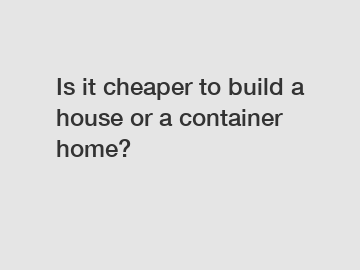Feb. 28, 2024
Construction
When it comes to building a new home, there are many factors to consider - the location, design, size, and most importantly, the cost. In recent years, the idea of building a house out of shipping containers has gained popularity as a more affordable and environmentally friendly alternative to traditional construction methods. But is it really cheaper to build a container home compared to a conventional house? Let's explore the costs associated with both options to find out.
The cost of building a traditional house can vary greatly depending on the size, design, location, and materials used. On average, the cost of building a new home in the United States can range from $150 to $300 per square foot, or even higher in more expensive markets. This means that a typical 2,000 square foot home could cost anywhere from $300,000 to $600,000 or more to build.
In contrast, building a container home can be a more cost-effective option. Shipping containers are readily available at relatively low prices, with a standard 40-foot container costing around $2,000 to $4,000, depending on the condition and location. Additionally, the modular nature of shipping containers makes construction faster and more efficient, which can also help reduce labor costs.

When it comes to design and customization, container homes offer a lot of flexibility. Containers can be stacked, cut, and combined in a variety of ways to create unique and modern living spaces. This can result in lower design and architectural fees compared to traditional home construction, where customizations can quickly add up in terms of both time and money.
Material costs for building a container home can also be lower compared to traditional construction. While containers do require insulation, flooring, plumbing, and electrical work to make them livable, the overall material costs can still be less expensive than building with traditional materials like wood and concrete.
Another factor to consider when comparing the costs of building a house versus a container home is maintenance and longevity. Shipping containers are designed to withstand harsh weather conditions and rough handling during transportation, which means they are durable and low-maintenance once converted into a home. With proper insulation and maintenance, a container home can last just as long as a traditional house.
However, it's important to note that building a container home is not without its challenges and hidden costs. Zoning and building code regulations can vary by location, and some areas may have restrictions on using shipping containers for residential purposes. In some cases, additional permits and inspections may be required, adding to the overall cost of the project.
Additionally, converting a shipping container into a livable space requires specialized skills and expertise, especially when it comes to cutting and welding the metal structure. Hiring qualified professionals to handle these tasks can increase the overall cost of building a container home.
In conclusion, while building a container home can be a more affordable option compared to traditional house construction, the overall cost will ultimately depend on a variety of factors including location, design, materials, and labor. If you're looking for a unique and cost-effective housing solution, a container home could be the right choice for you. Just be prepared to do your research, plan carefully, and budget accordingly to ensure a successful and budget-friendly build.
The company is the world’s best Container House Expandable, Expandable Prefab Homes, Container Granny Flat for Sale supplier. We are your one-stop shop for all needs. Our staff are highly-specialized and will help you find the product you need.
Previous: Are Floating Glass Bubbles the Future?
Next: Revolutionizing Modern Architecture: Chinese Folding House?
If you are interested in sending in a Guest Blogger Submission,welcome to write for us!
All Comments ( 0 )